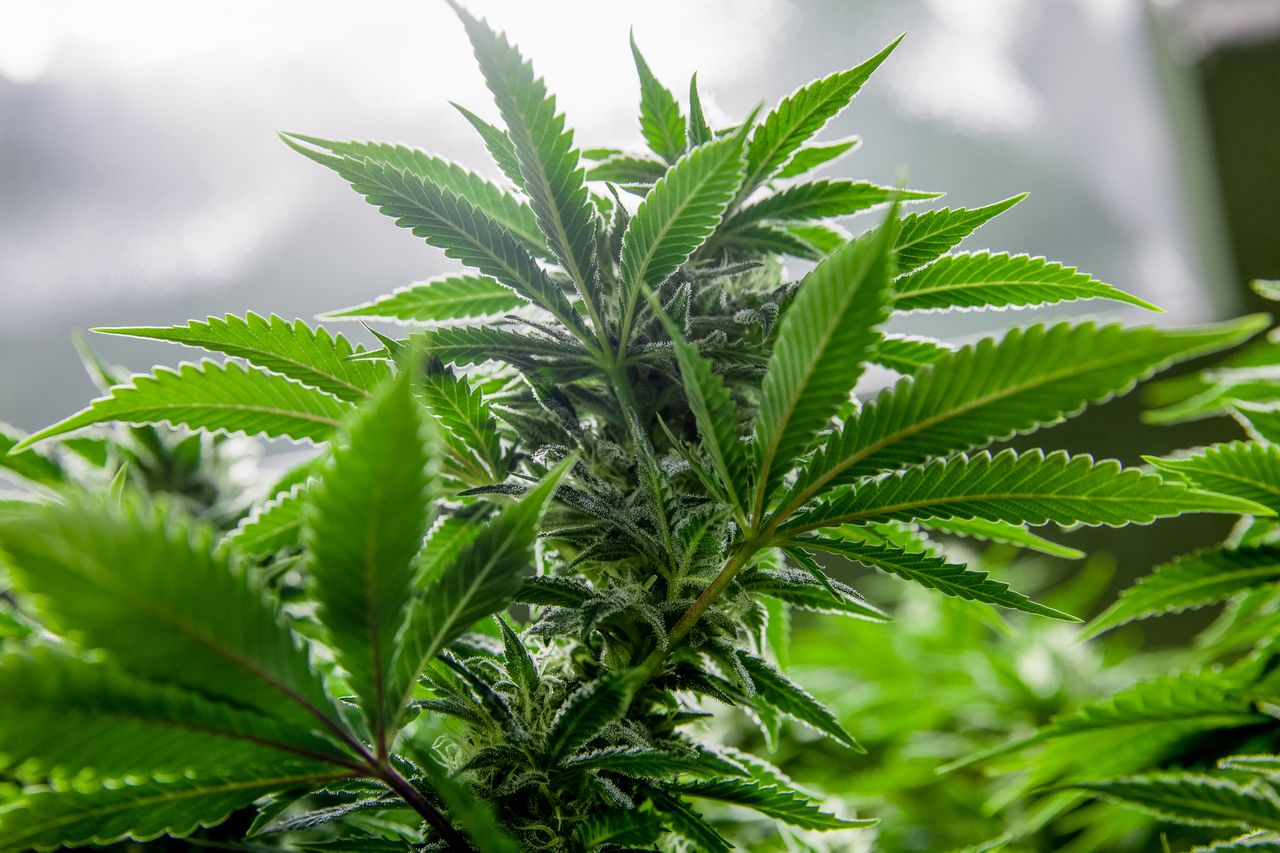Pot Stocks Are Getting Crushed. What You Need to Know.
What goes up, must come down. But not necessarily this fast.
Canadian marijuana stocks that posted staggering gains on Wednesday fell just as fast Thursday, while U.S. multistate operators, or MSOs, were dragged down, but fared a bit better.
Tilray stock (ticker: TLRY) fell 49.7% Thursday, erasing all its gains from the prior trading day. Aphria stock (APHA) closed down 35.8%. Those companies expect to close a merger in the first half of the year. Under the deal announced in December, an investor would receive about 0.84 shares of the combined Tilray for every share of Aphria that they owned. Aurora Cannabis shares (ACB) were down 23.5%, while Canopy Growth (CGC) fell 22.1%.
ETFMG Alternative Harvest (MJ), an exchange-traded fund with exposure to the pot business, fell 24.6% from its Wednesday close. The ETF is still up about 74.5% year-to-date.
Meanwhile, Curaleaf (CURLF), a U.S. operator that lists shares over-the-counter in the U.S., fell 7.2%. Peers Green Thumb Industries (GTBIF), Cresco Labs (CRLBF), and Trulieve Cannabis (TCNNF) were down between 6% and 8%.
Canadian pot stocks, especially, have rallied in recent months on a wave of sentiment-driven gains as investors bet on positive political developments. Meanwhile, U.S. growers, which would benefit from an improved legal landscape, have lagged their competitors that operate in the smaller Canadian market.
Cantor Fitzgerald analyst Pablo Zuanic told Barron’s in an email that the recent action in pot stocks involving Reddit traders makes it hard to predict day-to-day moves, especially with the more-liquid Canadian growers.
“A look at the [GameStop] stock chart should be cautionary,” Zuanic added. “That said, we continue to think the top US MSOs are attractively valued taking a long-term view, even though they will get some of the Canadian downdraft.”
Ironically, some observers last month likened the move in GameStop (GME) to Tilray’s brief parabolic jump in 2018. The WallStreetBets forum on Reddit was recently littered with posts about pot stocks. One of the top posts Thursday morning likened the recent action in Canadian pot stocks to a casino.
Zuanic said on Wednesday that the gap in performance between U.S. and Canadian licensed producers, or LPs, could signal interest from the Robinhood crowd. Robinhood users can’t trade over-the-counter stocks on the platform.
“Sure, the news flow backdrop has also helped (the notion the US will open soon and Canadian LPs will benefit; news about exports), but we think this does not explain the big delta in Canada vs. US performance,” he said. “We wonder if the average RH retail investor knows the difference between an MSO and an LP, and the very different fundamentals of both cannabis markets.”
Ihor Dusaniwsky, a managing director at short-selling analytics firm S3 Partners, noted on Wednesday that there’s also a short-selling angle at play. Tilray began the year with short interest at about 48% of shares available for trading, according to S3 Partners. S3 estimates a recent short interest at 23% of shares available for trading, implying a large amount of covering, which helps drive prices up.
Short sellers sell borrowed shares with the hope they can replace the stock by purchasing it at a lower price. Dusaniwsky notes that Tilray and Cronos (CRON) saw the largest yearly decrease in short interest as a percentage of shares available for trading. He added that the top 20 cannabis shorts in the sector were down $4.32 billion in net-of-financing mark-to-market losses in 2021 by Wednesday.
“The yearlong rally has spurred short squeezes in most of the top 20 most shorted stocks in the sector and we should see the squeezes continuing, especially if the potential for nationwide U.S. cannabis legalization continues to increase,” Dusaniwsky added.
As with GameStop, the traditional buy-and-hold investor might want to stay away until things cool down.
 Copyright 2020, Dow Jones & Company, Inc. All Rights Reserved Worldwide. LEARN MORE
Copyright 2020, Dow Jones & Company, Inc. All Rights Reserved Worldwide. LEARN MORE
This stylish family home combines a classic palette and finishes with a flexible floorplan
Just 55 minutes from Sydney, make this your creative getaway located in the majestic Hawkesbury region.
Continued stagflation and cost of living pressures are causing couples to think twice about starting a family, new data has revealed, with long term impacts expected
Australia is in the midst of a ‘baby recession’ with preliminary estimates showing the number of births in 2023 fell by more than four percent to the lowest level since 2006, according to KPMG. The consultancy firm says this reflects the impact of cost-of-living pressures on the feasibility of younger Australians starting a family.
KPMG estimates that 289,100 babies were born in 2023. This compares to 300,684 babies in 2022 and 309,996 in 2021, according to the Australian Bureau of Statistics (ABS). KPMG urban economist Terry Rawnsley said weak economic growth often leads to a reduced number of births. In 2023, ABS data shows gross domestic product (GDP) fell to 1.5 percent. Despite the population growing by 2.5 percent in 2023, GDP on a per capita basis went into negative territory, down one percent over the 12 months.
“Birth rates provide insight into long-term population growth as well as the current confidence of Australian families,” said Mr Rawnsley. “We haven’t seen such a sharp drop in births in Australia since the period of economic stagflation in the 1970s, which coincided with the initial widespread adoption of the contraceptive pill.”
Mr Rawnsley said many Australian couples delayed starting a family while the pandemic played out in 2020. The number of births fell from 305,832 in 2019 to 294,369 in 2020. Then in 2021, strong employment and vast amounts of stimulus money, along with high household savings due to lockdowns, gave couples better financial means to have a baby. This led to a rebound in births.
However, the re-opening of the global economy in 2022 led to soaring inflation. By the start of 2023, the Australian consumer price index (CPI) had risen to its highest level since 1990 at 7.8 percent per annum. By that stage, the Reserve Bank had already commenced an aggressive rate-hiking strategy to fight inflation and had raised the cash rate every month between May and December 2022.
Five more rate hikes during 2023 put further pressure on couples with mortgages and put the brakes on family formation. “This combination of the pandemic and rapid economic changes explains the spike and subsequent sharp decline in birth rates we have observed over the past four years,” Mr Rawnsley said.
The impact of high costs of living on couples’ decision to have a baby is highlighted in births data for the capital cities. KPMG estimates there were 60,860 births in Sydney in 2023, down 8.6 percent from 2019. There were 56,270 births in Melbourne, down 7.3 percent. In Perth, there were 25,020 births, down 6 percent, while in Brisbane there were 30,250 births, down 4.3 percent. Canberra was the only capital city where there was no fall in the number of births in 2023 compared to 2019.
“CPI growth in Canberra has been slightly subdued compared to that in other major cities, and the economic outlook has remained strong,” Mr Rawnsley said. “This means families have not been hurting as much as those in other capital cities, and in turn, we’ve seen a stabilisation of births in the ACT.”
This stylish family home combines a classic palette and finishes with a flexible floorplan
Just 55 minutes from Sydney, make this your creative getaway located in the majestic Hawkesbury region.





















